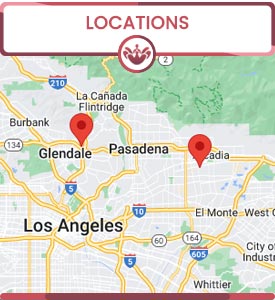How to Recognize the Symptoms of Uterine Fibroids
At The OB-Gyn and Incontinence Center, Dr. Prema Kothandaraman helps women recognize and understand the symptoms of uterine fibroids early. These noncancerous growths can cause heavy menstrual bleeding, pelvic pain, bloating, or frequent urination. Dr. Kothandaraman emphasizes the importance of timely evaluation through pelvic exams and imaging to ensure accurate diagnosis. For more information, contact us today or book an appointment online. We have convenient locations to serve you in Arcadia, and Glendale, CA.


Table of Contents:
What are the common symptoms of uterine fibroids?
How can I tell if I have uterine fibroids?
Can uterine fibroids cause infertility?
Can fibroids cause frequent urination?
Recognizing the Symptoms of Uterine Fibroids with Dr. Prema Kothandaraman
We understand how uterine fibroids can impact your daily life and overall well-being. Uterine fibroids are noncancerous growths that develop in or on the uterus, and their symptoms can vary greatly depending on their size, number, and location.
Many of our patients come to us seeking relief from symptoms such as heavy or prolonged menstrual periods, which can lead to anemia due to excessive blood loss. Others experience pelvic pain or pressure, which may feel like a persistent ache or a sense of fullness in the lower abdomen. As specialists in both gynecology and urinary health, we often see women with fibroids who also struggle with frequent urination or difficulty emptying the bladder—symptoms that can occur when fibroids press against the bladder.
In addition, some women notice pain during sexual intercourse, lower back pain, or even swelling and enlargement of the abdomen due to larger fibroids. Fibroids may also affect reproductive health, leading to difficulty getting pregnant or complications during pregnancy. While some women experience significant symptoms, others may have fibroids and remain completely asymptomatic.
We specialize in comprehensive women’s health, including the diagnosis and management of uterine fibroids. Uterine fibroids are noncancerous growths that develop in or on the uterus. Many women with fibroids do not experience any symptoms, making them difficult to detect without a professional evaluation. However, there are several signs that may indicate the presence of fibroids.
One of the most common symptoms is heavy menstrual bleeding—this may involve periods that are longer than usual or the passage of large blood clots. You might also experience pelvic pain or a sense of fullness in the lower abdomen. Importantly, because fibroids can press against the bladder, some women notice frequent urination, difficulty fully emptying the bladder, or even urinary incontinence—an area in which our center has extensive expertise. Fibroids can also cause constipation if they press on the rectum, pain during intercourse, or lower back pain.
If you are experiencing any of these symptoms, or if you have noticed changes in your menstrual cycle or bladder habits, it is important to seek care from a qualified women’s health provider. At The OB-Gyn & Incontinence Center, our experienced team offers thorough pelvic examinations and advanced imaging techniques, such as ultrasound, to accurately diagnose uterine fibroids and determine their impact on your health—including your urinary function. We will discuss the most effective treatment options tailored to your individual needs, whether your primary concern is discomfort, menstrual changes, or urinary symptoms.
Uterine fibroids are noncancerous growths that can develop in or on the uterus. We frequently see patients concerned about fibroids—especially when it comes to fertility and reproductive health. While many people with fibroids are able to conceive and have healthy pregnancies, these growths can sometimes play a role in infertility, depending on their size, number, and location within the uterus.
Certain types of fibroids, such as submucosal fibroids that distort the uterine cavity, may interfere with embryo implantation or increase the risk of miscarriage. Large fibroids may block the fallopian tubes, making it more difficult for sperm to reach the egg or for a fertilized egg to move into the uterus. In some cases, fibroids can also alter the shape of the cervix, affecting the number of sperm that can enter the uterus.
We want our patients to know that not all fibroids cause fertility problems—many individuals with fibroids conceive naturally. However, if you are experiencing difficulty conceiving and have been diagnosed with uterine fibroids, our experienced providers can help. We offer advanced imaging, such as ultrasound and MRI, to accurately assess the size and location of your fibroids.
Our team will work with you to develop a personalized treatment plan that fits your reproductive goals. We offer a range of options, including medication, minimally invasive procedures, and surgery, depending on your specific needs.
Yes, fibroids can cause frequent urination—a concern we often address at The OB-Gyn & Incontinence Center. Uterine fibroids are noncancerous growths that can develop in various locations within the uterus. When fibroids grow on the front wall of the uterus or reach a significant size, they may press against the bladder, which is situated just in front of the uterus. This pressure can reduce the bladder’s capacity to hold urine, resulting in the need to urinate more often, both during the day and at night.
Some women may find themselves making frequent trips to the bathroom, even if only small amounts of urine are passed each time. Additionally, fibroids can sometimes make it difficult to fully empty the bladder, leading to the sensation of needing to urinate again soon after.
We specialize in evaluating and treating women’s pelvic health concerns, including symptoms like frequent urination, pelvic pain, and bladder control issues. If you are experiencing frequent urination along with other symptoms such as heavy menstrual bleeding, pelvic discomfort, or a feeling of abdominal fullness, we encourage you to schedule a consultation. Our expert team will work with you to determine the underlying cause and develop a personalized treatment plan to help you regain comfort and confidence in your daily life.
At The OB-Gyn and Incontinence Center, Dr. Prema Kothandaraman provides insight into understanding and identifying the symptoms of uterine fibroids. These noncancerous growths in the uterus can cause heavy menstrual bleeding, pelvic pain, bloating, and frequent urination, depending on their size and location. Recognizing these signs early allows women to seek timely evaluation and appropriate management. Dr. Kothandaraman highlights the importance of regular checkups and imaging studies to confirm the presence of fibroids and assess their impact on reproductive health. By staying informed about the symptoms and risk factors, patients can take proactive steps toward maintaining comfort and overall well-being.
Don’t let fibroids or incontinence disrupt your routine—contact The OB-Gyn & Incontinence Center to discuss your symptoms and explore your options for relief. For more information, contact us today or book an appointment online. We have convenient locations to serve you in Arcadia, and Glendale, CA. We serve patients from Arcadia CA, Glendale CA, Monrovia CA, Pasadena CA, Los Angeles CA, Burbank CA, and surrounding areas.


Additional Services You May Need
▸ Urogynecology
▸ Minimally Invasive Gynecology
▸ Monalisa & Medical Aesthetics
▸ Bioidentical Hormone Replacement Therapy
▸ Urinary Incontinence
▸ Pelvic Organ Prolapse
▸ Painful Bladder
▸ Urinary Tract Infection
▸ Genitourinary Syndrome of Menopause
▸ Female Sexual Dysfunction
▸ Urinary Retention
▸ Vaginal Laxity & Prolapse
▸ Postpartum Pelvic Floor Problems
▸ PCOD
▸ Bladder Prolapse Repair
▸ Urgent PC
▸ Fibroids
▸ Excessive Bleeding
▸ Pelvic Pain
▸ Birth Control & IUD
▸ Vaginal & Pelvic Infection
▸ Monalisa Touch
▸ STD
▸ TempsureVitalia
▸ Biote Pellet Therapy
▸ Topical BHRT
▸ Flexsure
▸ Rectal Prolapse Repair
▸ Tempsure ENVI
▸ Minimally Invasive Pelvic Surgery for Incontinence



